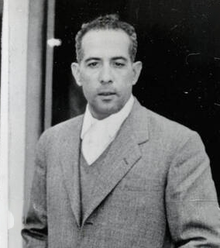The History of Algeria from 1962 to 1999 includes the period starting with preparations for independence and the aftermath of the independence war with France in the 1960s to the Civil War and the 1999 presidential election.

Mohamed Boudiaf, also called Si Tayeb el Watani, was an Algerian political leader and one of the founders of the revolutionary National Liberation Front (FLN) that led the Algerian War of Independence (1954–1962). Boudiaf was exiled soon after Algerian independence, and did not go back to Algeria for 27 years. He returned in 1992 to accept a position of Chairman of the High Council of State, but was assassinated four months later.

The National Liberation Front commonly known by its French acronym FLN, is a nationalist political party in Algeria. It was the principal nationalist movement during the Algerian War and the sole legal and ruling political party of the Algerian state until other parties were legalised in 1989.

Ahmed Ben Bella was an Algerian politician, soldier and socialist revolutionary who served as the head of government of Algeria from 27 September 1962 to 15 September 1963 and then the first president of Algeria from 15 September 1963 to 19 June 1965.

Houari Boumédiène was an Algerian military officer and politician who was the second head of state of independent Algeria from 1965 until his death in 1978. He served as Chairman of the Revolutionary Council of Algeria from 19 June 1965 until 12 December 1976 and thereafter as president of Algeria until his death.

Ferhat Abbas was an Algerian politician who acted in a provisional capacity as the then yet-to-become independent country's Prime Minister from 1958 to 1961, as well as the first President of the National Assembly and the first acting Chief of State after independence.

Hocine Aït Ahmed was an Algerian politician. He was founder and leader until 2009 of the historical political opposition in Algeria.
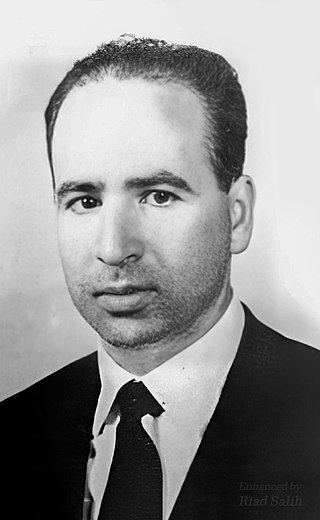
Krim Belkacem was the historic leader of the National Liberation Front during the Algerian War. As vice-president of the GPRA, he was the sole signatory of the Évian Accords on the Algerian side. After the 1965 coup d'état, he went into exile and was assassinated in Germany in 1970.
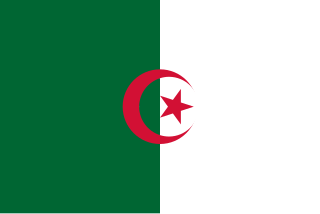
The Provisional Government of the Algerian Republic was the government-in-exile of the Algerian National Liberation Front (FLN) during the latter part of the Algerian War of Independence (1954–1962).

The Oujda group, also known as the Oujda clan, was a group of military officers and politicians in Algeria that operated during the Algerian War (1954–62). After the independence of Algeria, the Oujda group dominated Algerian politics after the Algerian summer crisis in 1962.
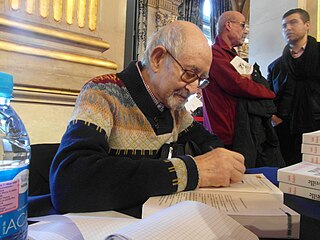
Sadek Hadjerès was an Algerian politician of the Algerian Communist Party.
Abdelhamid Mehri was an Algerian resistance fighter, soldier and politician.

Slimane Bentebal, better known as Lakhdar Bentobal, is a former Algerian resistance fighter.
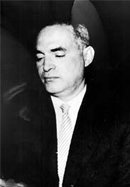
Ahmed Francis was an Algerian politician and nationalist, born in Relizane in a family originally from Miliana.

Mhamed Yazid was an Algerian independence activist and politician. He joined the nationalist Parti du Peuple Algérien (PPA) in 1942, and later, after moving to Paris, France for university studies, joined its successor organization, the MTLD, where he became a member of the central committee. He was arrested in 1948 and sentenced to two years of prison for "carrying suspicious documents". He later led hunger strikes in prison.

Colonel Saïd Mohammedi, also known as Si Nacer, was an Algerian nationalist and politician.

Dr. Mohamed Lamine Debaghine was an Algerian politician and independence activist.
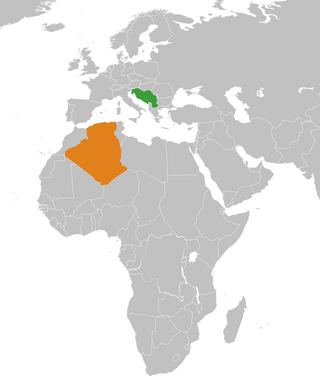
Algeria–Yugoslavia relations were historical foreign relations between Algeria and now split-up Socialist Federal Republic of Yugoslavia. Both countries self-identified with the wider Mediterranean region and shared membership in the Non-Aligned Movement. During the Algerian War Yugoslavia provided significant logistical and diplomatic support to the Algerian side which affected its intra-European relations with France. Yugoslavia was the first European country to openly support the FLN.
Ahmed Mahsas was an Algerian militant in the nationalist movement against French Algeria.

The 1962 Algerian crisis, also known as the 1962 Algerian coup d'état, was a period of political unrest that happened after Algeria gained independence from France on 5 July 1962. It was a power struggle between factions within the National Liberation Front. It involved the Provisional Government of the Algerian Republic headed by Benyoucef Benkhedda against the Oujda Group headed by Ahmed Ben Bella.
